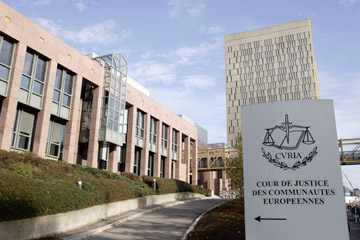EU retraction of listing: if uncontested, may give LTTE a free hand
By Manjula Fernando
“A freeze on LTTE assets will hurt its ability to milk funds from
Tamil expatriates,” said observers following the decision by the
European Union to list the LTTE as a banned terrorist organisation
within the territory of 25 countries in 2006.
|

Lawyer Victor Koppe |
The ban which came about as a culmination of a decade old campaign by
the Sri Lankan State and the European Commission's own research, froze
the assets of the group, putting a noose around its fund raising
activities that pumped up the ruthless LTTE terror war.
The assassination of former Sri Lankan Foreign Minister Lakshman
Kadirgamar by an LTTE sniper in August 2005, was the last nail in the
coffin that sealed the LTTE's fate in the European Union.
Unfortunately after eight long years the listing is to be retracted.
As the news broke out on Thursday in Luxembourg, ‘the General Court
of the EU annuls, on procedural grounds, the Council measures
maintaining the Liberation Tigers of Tamil Eelam on the European list of
terrorist organisations’, the LTTE has already begun celebrating.
Classification
The ruling, if not contested, may give a free hand to the LTTE to
extort money from the Tamil expatriate community in a total of now 28
countries. Since 2006, the EU has expanded by three new members –
Romania, Bulgaria and Croatia. The ruling was given in a case moved by
the LTTE in 2011.
With the ruling the LTTE stand a chance to be exempted from the ‘EU
list relating to frozen funds of terrorist organisations'. But, the
Court has not made any implication revoking their classification as a
terrorist organisation, an External Affairs Ministry official affirmed.
In short, the LTTE has filed action in the European Court of Justice
challenging the validity of certain measures (which take the form of
sanctions - including the freezing of assets) imposed on the LTTE by the
EU Council, on the footing that it was an internationally known
terrorist organisation, a senior official at the Attorney General's
Department explained.
At the conclusion, the Court arrived at a finding that the European
Council in deciding on measures against the LTTE, including freezing of
assets, due process has not been followed. In continuing the LTTE
listing the Council has taken into consideration judgments of Indian
Courts.
The Court has agreed with the approach that such Indian courts can be
considered as ‘competent foreign domestic authorities’ but has ruled
that the Council must re-assess the situation and rectify procedural
shortcomings.
Assets
It is on this footing that the EU Court has annulled the measures,
but has temporarily kept alive the effect of the measures imposed, such
as the freezing of the assets. This has been done to facilitate the
Council to ‘reassess the situation’ and possibly ‘adopt new measures’
having followed the correct procedure or appeal to the EU Court of
Justice, which has appellate power over the EU Court, a senior official
of the AG's Department said.
 |
|
The Court of Justice of the
EU in Luxembourg. |
The defendants; the EU supported by the Netherlands, the UK and the
European Commission - have been granted two months to appeal or rectify
the procedural flaws to try and re-impose the measures against the LTTE.
A press release from the General Court of the European Union which
announced the judgment said, despite the ruling the assets remained
frozen temporarily to ensure effectiveness of a possible future action.
The LTTE tried to convince the Court that their confrontation with
the Government of Sri-Lanka was an ‘armed conflict’ within the meaning
of international law, subject only to international humanitarian law and
not to anti-terrorist legislation. ‘
This argument did not hold ground as the Court maintained that ‘EU
law on prevention of terrorism also applies in armed conflicts within
the meaning of international law'.
Verdict
The lawyer who represented the LTTE's interests in the case, Attorney
Victor Koppe of Amsterdam-based law firm Bohler Group, argued that the
LTTE no longer used military means to achieve its goals in the
post-terrorism context.
The Indian Deccan Chronicle in a story dated October 17, said the
verdict of the European Court was music to Eelam campaigners in the
Tamil Nadu. Tamil politician and LTTE campaigner Nedumaran had already
demanded that the Central Government should take a cue from the EU
ruling.
Victor Koppe also defended five LTTE activists who were accused of
raising Euro 130 million for terrorism funding in a case before a Dutch
Court three years ago. The Court in a verdict delivered in October 2011
ruled all five guilty as accused and sentenced them two to six years in
prison.
Dutch police arrested the five men in June 2010 after an
investigation into the LTTE organisation.
The prosecution told Court, ‘Fund-raisers used threats to wrest money
from the Tamil community in the Netherlands.
That continued even after the military crushed the Tigers and killed
its leader Velupillai Prabhakaran in May 2009. Groups of fundraisers
would repeatedly visit the homes of Tamils and threaten that they would
not be allowed to visit their relatives in Sri Lanka if they did not pay
up.’
Assistance
It echoed a stance reiterated by the Sri Lankan Government, the LTTE
front organisations continued to operate among the 800,000 Sri Lankan
Tamil diaspora community, majority of whom scattered in the Europe, even
after the LTTE's military defeat.
The Dutch case was built up on a USB stick that contained the LTTE’s
2010 financial plan, seized from one of the convicts, Selliah, whom the
court described as “an unmissable link” in the LTTE.
The Sri Lankan Government supported the EU in its listing of the LTTE
and has provided information supportive of the regulation to facilitate
the continuation of the ban. In a release issued on Thursday, the
External Affairs Ministry said, ‘the Government remained committed to
provide the European Commission and EU Member States any further
assistance and information available, to maintain the LTTE as a brutal
terrorist organization'.
It cautioned, ‘The ECJ decision may have an impact including from a
security perspective, on the large majority of Sri Lankans living in EU
territory, as well as EU citizens of Sri Lankan origin, who are likely
to come under pressure once again by pro LTTE activists'.
The Court case to revoke the LTTE listing within the EU is a clear
signal as to how desperate, strong and organised the LTTE international
campaign which strive to revive their ‘dormant’ outfit. The cases moved
by the LTTE were classified as T-208/11 and T-508/11 Liberation Tigers
of Tamil Eelam (LTTE) Vs Council. A senior official in the External
Affairs Ministry said although the LTTE was banned in the EU in 2006,
they shifted their operations to front organisations which kept changing
their nom de guerre from time to time to mislead the local authorities.
Their activities have continued unabated under various fronts such as
Tamil Youth Organisation and Tamil Coordinating Committee.
Funding
The official said there were many such fronts that it was hard to
keep a tab on each and every one them and lifting of the EU ban will
certainly embolden their campaigns and put lives of moderate diaspora
members at risk. Sri Lanka in a bid to shut funding sources of LTTE
recently banned 16 voluntary diaspora organisations identified as LTTE
fronts and 424 individuals.
The Island reported on Friday that an alleged key LTTE front Global
Tamil Forum (GTF) had urged intervention by the UK at the UN Security
Council to prevent the Government from ‘exploiting the Security Council
Resolution 1373 of 2001 (UNSCR 1373)’ to ban these groups and
individuals. International terrorism expert, Prof. Rohan Gunaratne said,
“With the same ruthlessness and deceptiveness the LTTE operated in Sri
Lanka, it is now functioning overseas.”
He said the LTTE cells are reorganising in Canada, US, UK, EU, and in
Australia to seek legitimacy. The LTTE approaches are not limited to
lobbying politicians and human rights organisations but also identifying
the gaps and loopholes in legal frameworks and penetrating them.
Opining that Governments worldwide must reflect on how terrorists
use, misuse and abuse the criminal-justice and prisons systems to their
advantage, he cautioned, "the de-proscription of the LTTE by EU serves
as a warning to the Europeans and others governments."
LTTE cells are planning similar cases in Canada, US, UK, and India
where the LTTE is still blacklisted. |

